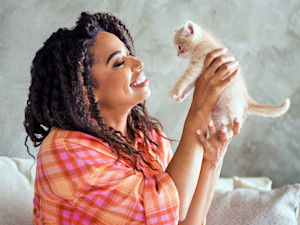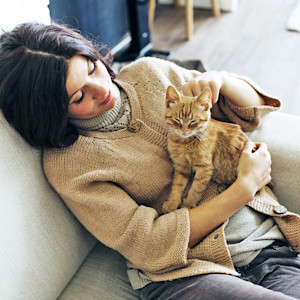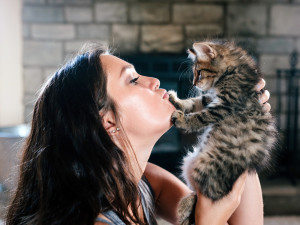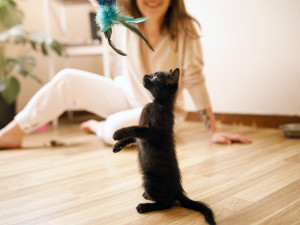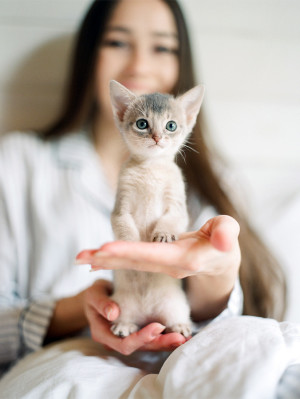Why Does Your Kitten Eat So Much?
Usually, a hungry, hungry kitten is perfectly normal. But here’s when a kitten eating a lot is cause for concern.

Share Article
In This Article:
Reasons Why a Kitten Might Be Eating So Much Normal vs. Abnormal Eating Patterns Tips on Managing Your Kitten’s Diet When to Consult a Vet
The internet is full of videos of kittens screaming at their pet parents at mealtime, climbing up their pant legs if dinner prep is taking too long, and diving head-first into a bowl of fresh food. This might have you wondering: When was the last time that kitten ate?
Sometimes, it feels like kittens have bottomless appetites. Although it seems impossible for such a little creature to eat so much, you might be surprised to learn that this is quite normal kitten behavior. With this in mind, let’s discuss why kittens seem to never get enough food — and when there might be cause for alarm.
Reasons why a kitten might be eating so much
Metabolism
One of the most likely reasons for kittens to have such voracious appetites is their metabolism. At this age, they require nutrients to not just support their normal body condition and function, but to also support their rapid growth. In fact, young kittens — less than four months old — can require up to two to three times more calories than their adult cat counterparts. This high caloric demand will slowly taper down once they hit various milestones, such as getting older or being altered (spaying or neutering).

Activity level
Kittens are known to play hard and sleep hard. As kittens age into adulthood and maturity, the amount of time they spend playing will typically decrease. This energy expenditure results in a higher calorie need, and may be a reason they are always happy to eat.
Growing phase
Kittens grow rapidly during their first year of life. Ensuring they receive appropriate nutrition will help support appropriate growth and development. This will set them up for a healthy adulthood.
Worms or parasites
Although they don’t normally cause a ravenous appetite, intestinal parasites are a common condition in young kittens. This can cause your kitten to feel more hungry than usual. Some intestinal parasites are visible in a kitten’s stool and can look like spaghetti or grains of rice. Others can only be identified with the use of a microscope. It is a great idea to bring a stool sample to your kitten’s first vet visit for this reason.
Potential medical conditions
Some medical conditions can cause cats and kittens to have an increased appetite, but this is more common in adult cats as they age. More often, we see systemic illnesses or medical conditions cause a decrease in appetite in kittens.
Behavioral issues
Kittens may get possessive or aggressive over food, especially when they’re living with several cats, additional pets, or children in the home. Providing your kitten with a safe space to eat, where they will not feel threatened by other pets or people, is incredibly important to ensure they are happy — and to avoid behavioral issues.
Normal vs. abnormal eating patterns
Younger kittens who have been weaned (around six weeks of age) usually require a meal every four to six hours, which will decrease in frequency as they mature. Most commonly, older kittens and adults are fed twice daily, or allowed to graze on their food throughout the day, as long as no other animals are threatening to eat that food.
It is typically recommended that kittens are fed a balanced diet specially formulated for them, and that the feeding guidelines on the bag are followed based on the kitten’s age and weight. By doing so, the kitten should be hungry at mealtime, but satisfied and content afterwards. If a kitten is gaining weight steadily and finishing their meals, this is a good sign of appropriate feeding.
If you notice your kitten is eating so quickly that they are vomiting afterward or does not appear to be satiated, additional steps may need to be taken. For example, kittens who eat fast and vomit shortly afterward may benefit from being fed smaller amounts of food over 20 to 30 minutes. Alternatively, you can get a specific bowl designed to slow down your kitten’s eating. If these methods do not help, a veterinarian should be consulted, because this may indicate a bigger issue, such as dietary intolerance.
Tips on managing your kitten’s diet
Kittens should be fed a commercially available diet that is specifically formulated for kittens. Avoid diets that are meant for adult cats, “supplemental feeding,” or “all life stages.” A kitten’s nutritional needs are very specific, and feeding them a balanced diet is essential for healthy growth and development.
Additionally, cats should not be fed a home-cooked or vegetarian diet, as this may result in serious or fatal side effects. Cats are obligate carnivores, meaning they must eat meat for normal development and function. Kittens should be fed based on the bag’s guidelines, typically determined based on your kitten’s age and weight. This will help you avoid over- or underfeeding them. For any questions regarding your kitten’s diet, it is best to consult your veterinarian.
When to consult a vet
If your kitten is eating a recommended amount of food but is not gaining weight, is vomiting, has diarrhea, is low in energy, or has any other concerning signs — it is best to have them seen by a veterinarian. Alternatively, if your kitten is not interested in eating or seems to have a picky appetite, this is another reason to have them evaluated.
Kittens should be seen by their vet every few weeks until they are about six months old. Changes in eating behaviors should be addressed during these visits, or even sooner if anything concerning is noticed.
FAQs
Should I let my kitten eat as much as they want?
No. As much as your kitten tries to convince you that they require a bottomless amount of food, it is important to regulate how much they eat based on the feeding guidelines (on the bag of food). This will prevent over-feeding, which will result in your kitten being overweight or obese, and lead to health problems down the road.
At what age do kittens stop eating so much?
A kitten’s calorie requirements generally start to taper down once they reach four months of age. This continues to diminish as they get older or hit various milestones, such as spaying or neutering procedures.
Why is my kitten so hungry all the time?
Your kitten is rapidly growing. This development demands a much higher amount of calories than adult cats require.
Will a kitten stop eating when full?
Some kittens are better at self-regulation than others. While some will stop once full, others will keep eating until they make themselves sick. For this reason, it is best to measure the amount of food you are feeding them and follow the feeding guidelines provided to you on the bag of food.

Dr. Gabrielle Fadl, DVM
After graduating from Kansas State University College of Veterinary Medicine, Dr. Fadl returned to the New York area to pursue a one-year rotating internship and has been working in general practice since. Dr. Fadl loves working in the pet space to foster the powerful human-animal bond. She hopes to continually learn and grow to practice the best quality medicine. Her motto is “Keep calm and try to take it as it comes.”
Related articles
![Woman snuggling her kitten on her lap.]()
Kitten Diarrhea: Causes, Symptoms, and Treatment
Gross? Yes. Important to discuss? Also, yes.
Kitten Teething: Do Kittens Lose Their Teeth?
Get those little chompers ready for the kitten tooth fairy.
![Woman holding brown kitten to her face.]()
8 Myths About Your Kitten—Busted By a Behaviorist
Forget everything you think you know about baby cats.
![Woman playing with a black kitten.]()
5 Kitten Behavioral Milestones You Should Know
Keep track of all their fun phases with these guidelines.
![Young woman showing gray kitten.]()
5 Development Stages You Should Know When You Get a Kitten
What to expect from birth to 16 months.


